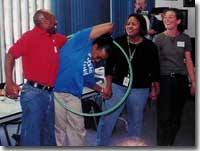|

United Nations Headquarters in New York |
"Peace is not the absence of conflict but the presence of creative alternatives for responding to conflict."
- Dorothy Thompson
Curriculum goal:
develop individual skills to prevent and positively resolve conflicts
Excerpts from Culture Camp Curriculum:
Conflicts are inevitable, they happen every day, and some are very disturbing. The key lesson for the campers is that causing harmony feels better inside than causing conflict. Once children have felt that they are valued and appreciated, they will want to create situations that reinforce the good feelings they feel.

cooperative play can be fun! |
One important component of creative conflict resolution is that it is not necessary to make the other person lose in order to feel like you have won. In fact, not just resolving conflict, but preventing it, makes our journey more pleasant. Communication and cooperation are the best ways to prevent conflict, especially when the conflict is due to misunderstanding.
Campers learn that in addition to active listening, there are other techniques that can help prevent conflict, or head it off before it gets too bad.
-
Sometimes going to an outsider or a group can help a person brainstorm solutions. It helps us figure out that there is usually more than one way to solve a problem.
-
Acting a problem out can help make the issues clear and spark suggestions on how to solve problems.
-
Negotiation is another skill that is useful to know in situations of conflict. That involves listing the problem, and the reason it's a problem. Then brainstorm about the problem, and list some different solutions.
|
Recipe for Resolving Conflict: There are some tried-and-true steps for resolving a conflict that is beginning to brew.
- Cool down
- Step away from the crowd
- Listen actively
- Don't be mean
- Ask for help from a 3rd person who is objective and not involved.
Part of the recipe is also trying to figure out what the other people want and feel. If a boy tries to take his ball away from other children who are playing with it, does he want the ball or does he really want to be part of the game? It can be useful to ask these questions in times of conflict:
 |
What do I want? What do I think you want? |
 |
What do I feel? What do I think you feel? |
 |
How could we both be happy? |
|
|

